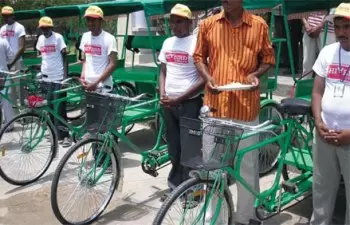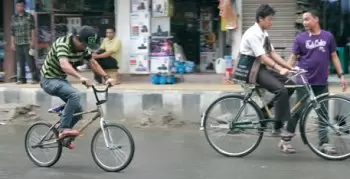Revolutions in these roads can lead us to a lesser polluted environment
03-May-2012
Vol 3 | Issue 18
There is a change of trend in certain pockets of India where communities are organising themselves to assert their right to walk and cycle. These zero carbon emitters have checked the country’s pollution from soaring. They also point to the route India needs to take to make cities clean. Anumita Roychowdhury charts this route along with Ruchita Bansal, Aniruddha Bhattacharjee and Shashank Gandhi
Fazilka, Punjab
LET’S HAIL A RICKSHAW
DILIP SINGH looks important. A rickshaw puller by profession, he is also the president of the south zone Ecocab’s Dial-a-rickshaw service in Fazilka, a town in Punjab. Wearing a crisp shirt and smart shoes, he flashes his android cellphone and says, “Gone are the days when rickshaw pullers were known for dirty, unkempt looks.” Just like taxis in other cities, rickshaws in Fazilka arrive at the doorstep when called on their service number.
 |
|
A fleet of rickshaw pullers of Fazilka’s Ecocab (Courtesy: ecocabs.org)
|
Complete with a fleet of uniform-wearing pullers and a strict etiquette code to follow, Dial a rickshaw is a modern twist to an old mode of transport. The rickshaw pullers can lose their licence if found misbehaving. Says Navdip Asija, an IIT graduate and a leading member of Graduates Welfare Association, Fazilka: “We did not want rickshaws to be known as a poor person’s transport. In this town even the wealthy and the aged demand such services.”
One can locate the nearest Ecocab call centre by using Google Maps or GPS. Ecocab also has a website where one can check details of the registered rickshaw pullers.
Every day about 500 rickshaw pullers ferry 10,000 passengers. Each zone in the town has a dedicated phone number and at least 30 rickshaw pullers are available round-the-clock. Every puller owns a cellphone. Around 65 per cent of the pullers own their rickshaws. Ecocab provides each puller an insurance policy worth Rs 50,000. A set of woollens every winter and medical checkup and medicines are also offered at discounted prices. They also get legal aid and support for children’s schooling.
Fazilka’s community is reaping the benefits of the service. The Ecocab saves as much as 1,500 litres of fuel every day for the city. It has made travel safer. Resident Asha Kumari says, “Initially it used to be a long walk before I could get a rickshaw. Now all I have to do is pick up my phone. I also feel very safe.”
The service has helped the prime business area of Ghanta Ghar become a car-free zone. Following the services’ success, the Punjab and Haryana High Court has issued suo moto direction to both Punjab and Haryana to find ways to replicate Ecocab service in the rest of the state.
Manipur
BAMBOO SHOWS THE WAY
BICYCLES MADE from locally available bamboo variety are set to revolutionalise mobility in the Northeast. A group of 500 residents in Imphal, Manipur, have picked up Bambusa affinis to replace the costly, energy intensive steel frames used in ordinary cycles.
For Ramananda Wangkheirakpam, the initiator of the group, Manipur Cycling Club, in Imphal, the bamboo bicycle is all about eco-mobility and a livelihood source. The bamboo design is attractive and functional, which is an effective way to get a critical mass of cycle users and cut down on purchase of conventional cycles.
“Everyone used to ride cycles in Imphal. Now cars have taken over. But the capital city can change that around,” Wangkheirakpam believes. The initiative is coupled with the city authorities’ effort to make Imphal car-free. Cars are not allowed within the city from 10 am to 5 pm—only walking and cycling is allowed.
The club has also started a cycle rental scheme. Schools, universities and areas with high footfalls like train stations are the immediate target. Every last Sunday of the month, club members gather to cycle around the city to popularise the bamboo cycle.
Bengaluru, Karnataka
A BIKE MOVEMENT
ICONIC INSTITUTIONS in Bengaluru, including the Indian Institute of Science and Bangalore University, have joined a community-driven bicycle sharing initiative to bring cycles back to the city. The Namma Cycle movement initiated by Ride-A-Cycle Foundation targets educational institutes and recreational sites.
Some eight bicycle stations have been set up within the 160 hectare-campus of the Indian Institute of Science. About 75 per cent students in the Bangalore University campus walk. Survey by the foundation shows that 85 per cent of the 75 per cent are willing to cycle if bicycles are made available. Under the initiative, a bicycle can be taken out for a maximum of 10 to 12 hours.
Students can register with an online system, get an ID card and pay a nominal pre-paid charge to use the service. A node manager will rent out the bicycle and record the rental transactions. After use, the bike can be dropped off at any station. All cycles are insured. The first three hours are free for subscribers; for casual users, 30 minutes are free of cost. Soon students will have the aid of a map, which will display stations within the campus. Namma Cycle is mobilising the corporate world to fund cycles and cycle stands. Bharti Cement Ltd and BSNL have come forward in support. Murali H R of Ride-A-Cycle Foundation has called for stronger government participation to scale up the movement.
Guwahati, Assam
BANK ON IT
CYCLE RICKSHAWS survive if their owners do. There are eight million rickshaw pullers in the country but 90 per cent do not own rickshaws. A quarter of their daily earning goes into paying rent. Pradeep Kumar Sarmah, therefore, started an innovative financing model called Rickshaw Bank. He integrated the bank model with Deep Bahan, a cost-effective rickshaw design by IIT-Guwahati. These rickshaws weigh 18 kg less than the conventional rickshaws.
 |
|
Manipur Cycling Club members take bamboo cycles for test run (Photo: Tiken Thockchom)
|
Being migrants and without residence proof, rickshaw pullers cannot open bank accounts or save, take credit or get an insurance. Rickshaw Bank provides a loan of Rs 13,219 to cover the cost of a Deep Bahan (Rs 10,800), ID card, licence and two-years of insurance. A five-member common liability group of pullers then acts as a guarantor for the loan and gives assurance that the beneficiary will not default.
A garage acts as a meeting point for 25 pullers and also works as a collection centre for daily repayment. The amount is recovered from each rickshaw puller at a flexible rate of Rs 20-Rs 40 for a maximum period of 18 to 24 months.
Advertisement space behind the rickshaw is sold to local businesses and corporate houses. This helps reduce risk of delayed payment. Till the time rickshaw pullers are repaying the loan, the advertisement revenue—an average of Rs 2,000 per annum per rickshaw—goes entirely to the Rickshaw Bank.
After the loan is repaid, 65 per cent of the revenue goes to the rickshaw puller and 35 per cent to the bank. More than 3,000 pullers in Guwahati own Deep Bahan rickshaws today. The bank also offers pullers loan for cooking gas and purchase items, like pressure cooker and other utensils.
The bank builds fund from grants and advertisement revenue. It leverages this fund to get loans from other financial institutions. To support the initiative, the state is providing 25 per cent subsidy on rickshaws.
Mumbai, Maharashtra
VOTE FOR CYCLE
A PILOT project called Cycle Chalao started a new trend in Mumbai in 2009. Cycles were made available at docking points located at various places, including railway stations. One could rent a cycle at a nominal fee paid through a swipe card and drop it off at a docking station close to the destination. Raj Janagam, the young initiator, says the enterprise grew from 33 users in the first month to 750 in 2011. Following the pilot’s success, Janagam plans to open 3,000 bicycle stands in at least five Indian cities by 2016.
As a part of his plans, Janagam signed a contract with Pune to provide 25 docking stations and 300 bikes. But the project hit a roadblock due to lack of funds. Pune municipality says the service should be given for free and funds should be sponsored by corporate houses. Janagam is running from pillar to post to get corporate sponsorship or advertisement commitment. He asks, “If flyovers and roads can get government funds why not cycles?”
Delhi too faces a similar problem in initiating bike programmes as municipalities are not prepared to give adequate land for parking and other support. Often such measures degenerate to grabbing space for advertisements without adequate promotional measures for bike sharing. Pune and Delhi should take a cue from Gujarat’s Rajkot municipality.
Rajkot has started work on its bicycle project using a more appropriate financing model. After an open bidding process, the municipality pays the requisite amount for setting up the infrastructure to the successful bidder and then recovers it from the revenue generated from user fee, advertisement and parking.
Gurgaon, Haryana
PEDAL YATRA
MANY CYCLISTS are captive users. But cities need those who will cycle out of choice. In many neighbourhoods across cities, groups are organising cycling clubs to fight back car mania. Pedal Yatri in Gurgaon is one such group.
“It all began when we started exploring hidden treasures around Gurgaon, Faridabad and Delhi,” says Rajesh Kalra, founder of Pedal Yatri. Pedal Yatri cyclists ride for 25 km every day and up to 90 km on weekends. “One should not consider cycling as merely a physical exercise—it is also a way to explore your surroundings. While moving around on our bikes, we explore vast fields and beautiful gardens in the Aravallis which are awe-inspiring,” says Jasbir Singh, a design consultant and co-founder of Pedal Yatri.
Pedal Yatri has nearly 200 members and has caught people’s imagination. All one needs to do is turn up at the assembly point with cycle and be ready to go. Cycling advocacy is being taken up by many grassroots groups and neighbourhood organisations. There is a strong latent demand for cycling. If supported by infrastructure and safer access, a massive pedal traffic can be induced in Indian cities. Kalra says, “We need a cycle service at the national level.”
By arrangement with Down to Earth
















